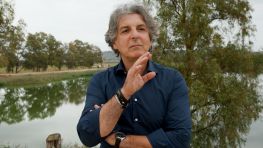 Marinella Ferrari
Marinella Ferrari Angelo Manna
The Return of Rice in Sicily
Born into a family dedicated to agriculture, Angelo Manna inherited from his father a passion for innovation and the constant pursuit of new crops, products, and cultivation methods. Even before graduating in agronomy, Angelo had already started working alongside his father in the family farm, which spans 10 hectares of irrigated land cultivated with various fruit tree species. Among these, the pesca di Leonforte stands out—a prized native peach variety that the company transforms into jams.
Angelo's approach is focused on enhancing local products, deeply rooted in the territory, such as legumes, whose cultivation has long-standing historical roots in the Enna province. Among the varieties cultivated are the fava larga di Leonforte, black lentils—nearly lost and recently revived by a group of Sicilian farmers—black chickpeas, ceci pascià, and cicerchia ennese. In this context of innovation, moving beyond the extensive cultivation of wheat, the Manna family decided to reintroduce rice cultivation, a crop that had disappeared from the island decades ago.
Video table of contents
- The farm, a vocation for local products and a drive for innovation.
- Sicily, Rome’s granary. The traditional rotation with legumes.
- Rice cultivation in Sicily.
- History and legends about arancini and rice.
- Late nineteenth century, the cultivation areas: the marshy plains of Lentini, Gela and Ribera.
- The idea of rice cultivation: from the idea of chef Carmelo Floridia.
- The first experimental field and the collaboration with the University of Catania.
- The second year: Arborio and Carnaroli.
- 2017, the last year of rice production.
- "Sorriso siculo".
- The non-submersion cultivation method to contain water use.
- Water shortage was not a determining factor in the decision to abandon rice cultivation. Leonforte was born on water.
- The difficulty of building a local production chain for rice.
- A great demand within the island for Sicilian rice for local recipes that use rice.
- The increase in demand for rice in Europe, a food that is good for you, not just to be consumed when you are sick. Economic convenience of rice.
- Collaboration with the University of Catania and the Ente Risi.
- Rice, a response to the depopulation of the Sicilian countryside? The need for a political direction for the island's agriculture.
- The ban on rice cultivation and malaria, a murky history.
- The aid we received for rice cultivation.
- The difficult relationship with the Land Reclamation Consortium of the Sicily Region and the water problem.
- There remains interest in developing a project at a regional level.
- Leonforte and the depopulation of inland areas: local agricultural resources as a deterrent.
- The need to operate in an encouraging political-administrative context.
- The Sicilian Water Reclamation Consortium: Farmers have no say in decisions. An obstacle to farmers rather than a resource.
- In Sicily, a rice that does not require chemicals.
Interview information
Country: IT
Region: Sicilia
City: Leonforte
Angelo Manna
Date of birth: 07-12-1982
School: University
Profession: Farmer
Languages: Italiano
Document by: Luca Ghiardo
Video by: Luca Ghiardo, Vincenzo Sottosanti
Created: 08-11-2024
Questo video fa parte del seguente archivio
Rice stories
Rice stories
Food is a fundamental resource for man and his health, both through the supply of nutrients and the ability to embody traits of human culture that play a leading role in our well-being.
Over time, each territory has built original ways in which to relate to the fruits of its land, enriching them with rituals, symbolic meanings and culinary customs. Much of these relationships have been lost following the years of the economic boom, with the exodus from the countryside to urban centers, with the advent of agriculture for mass production and ultimately with the globalization of markets and the consequent impoverishment of the heritage of biodiversity and ethnodiversity.
The purpose of this archive is to collect evidence relating to the main rice production area in Europe, that is the Po Valley, and to investigate, through the analysis of textual sources and testimonies collected in the field, both what survives of this heritage, and the ways in which which has evolved and reached us, paying particular attention to the explicit and implicit links that bind food and health.






